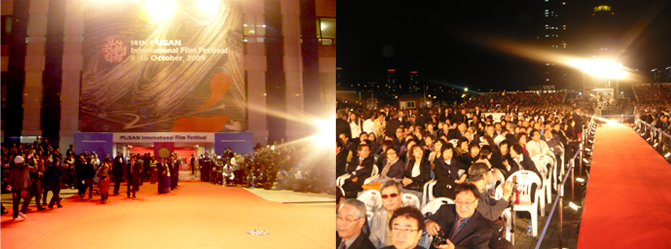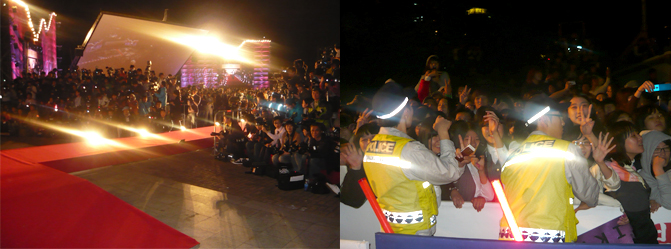BIGGER AND BETTER THAN EVER
The self-proclaimed hub of Asian Cinema is facing a critical year. A dip in favour corresponded with a dive in Korean Box Office, a paucity of art house hits and a film market that was beset with problems. Pusan knows that this is the year when these problems must either be overcome or be seen to be on the way to be overcome.
The global economic crisis has had an impact on many festivals. Here in Busan (Yes I know it’s confusing, but let me ask you how many of you have eaten Beijing Duck lately?) however, the Pusan International Film Festival has responded by increasing the number of films screening. With strong financial support from the Busan mayor who is up for re-election next year, that increase of course is primarily manifested in Asian films. But the festival has also made a conscious effort to include more US and French films to help lift the festival out of an Asian ghetto.
The energy required to lift PIFF to a new level was in full evidence on opening. Always a gala affair PIFF ensures the Korean audience embrace even the lowliest of guests (yep including journalists) into the most adored and welcome of visitors. Doing nothing to quash those gay rumours (see the PiFan blog) Darcy Parquet and I walked the red carpet together eliciting cheers and screams as we went. Despite a who’s who of Korean film who followed in our footsteps to my ears the only duo who came close to matching Darcy’s and mine welcome was Josh Hartnett and Lee Byung-hun. Josh got more offers of handshakes from the screaming crowd, but once they got over the initial shock I think an unidentified drag queen beat even the visiting American on the handshakes.
The opening night film, Good Morning President, unlike most previous PIFF opening nighters is a clear commercial Korean film. Since the opener is always a sell-out regardless of genre, the selection is clearly a deliberate statement. Noticeably in last year’s PIFF statistics the indie ghetto of New Currents had a significantly lower attendance rate by Korean audiences than any other section of the festival. By programming a crowd pleaser the festival is speaking to local audiences and letting them know that they are being listened to. It also gives non-Koreans a chance to see an authentic Korean film rather than arty imposture (though so many foreign guests get up and leave once the red carpet spectacle is over).
Unfortunately, even if they had stayed, Good Morning President is not the film to win commercial acolytes from the international festival faithful. Clocking in at 131 minutes (note to festival directors: after several speeches and particularly after sitting in the windy recesses of Busan’s Yachting Centre, audiences actually would prefer something around 90 minutes) the opener was a trilogy of stories about three successive Presidencies in South Korea, The first is about an aging President who having bought a ticket in a government lottery is conflicted about what to do when he actually wins the lottery. The second is the story of a youthful JFK-like figure (sans womanizing) who is confronted by a peculiar choice. The last section tells of South Korea’s first female President and the effect it has on her spouse. Each section has genuine wit and earthy charm, but lacks the sophistication that will appease art house audiences. The film is due for domestic release just after the festival closes and to tell the truth I’m not sure the film’s tone is sufficiently maintained to fully appease commercial audiences. Given that South Korea is going through a difficult time politically, I’m not sure that local audiences are going to cuddle up to a film that takes such a tender view of politicians and their foibles.
The days ahead look to become a blur of cinemas from Haeundae (now that would have been a fab opener for PIFF) to the festival’s new epicentre Centum City. Too busy to blog continuously at PIFF. But I’m curious to see that the New Currents programme has been infiltrated by seven films that will be projected in 35mm which augurs that the quality may be higher than in recent years (that said Members of the Funeral was one of the most memorable New Currents discoveries in years). Also underlining PIFF’s new internationalist – not just Asian focus – is the new Flash Forward competition offering prize money for a non-Asian film. Just as Cannes and Berlin are not tied exclusively to the fortunes of the French and German film industries, it is best that the PIFF is not hamstrung by the condition of the South Korean film industry. Whether the effort to make PIFF bigger and better than ever bears fruit will be more evident as the end of the festival rolls around. And as always with Tokyo International Film Festival at PIFF’s heels, TIFF is the best place to judge that from. Next bulletin from Tokyo in about 10 days time.


